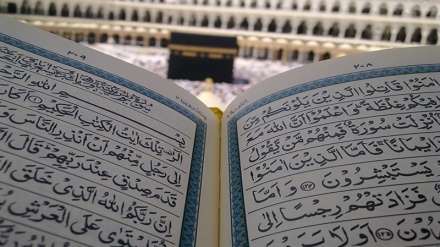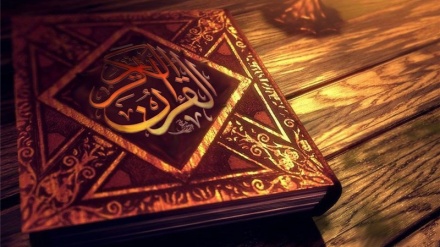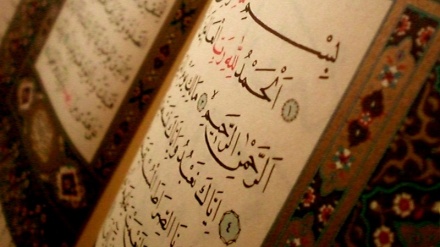Path towards Enlightenment (1007)
Welcome to our weekly episode of “Path towards Enlightenment”, which is an endeavour to make you and us familiar with an easy and fluent explanation of God’s Final Scripture to all mankind, the holy Qur’an that was revealed to the Last and Greatest of all Messengers, Prophet Muhammad (Blessings of God upon him and his progeny).
Last week we completed explanation of “Surah Saff” and from this Friday and the next we embark on explanation of the next Surah, that is, “Surah Jumu’ah”, which is number 62 in the serial order of compilation of the holy Qur’an.
Revealed in Medina it has 11 Ayahs and enjoins the believers to proceed to the ritual congregational prayer on Fridays by quitting all commercial transactions on hearing the Azaan or the call to Prayer, otherwise they deserve censure. The Surah derives its name from “Friday”. It opens with the glorification of Allah and the Prophet’s call. It says that the Muslims are not supposed to be like the Jews to whom God granted the Torah but they failed to act upon it.
We now invite you to listen to the opening Ayah of this Surah
“In the Name of God, the Compassionate, the Merciful – Whatever there is in the heavens and whatever there is in the earth, glorifies Allah, the Sovereign, the All-Holy, the All-Mighty, the All-Wise.”
This Surah, like the previous one, opens with the Glory of the Almighty Creator Whom everything in the universe, whether animate or inanimate glorifies, since as the Sovereign, the Omnipotent, the All-Wise, and the All-Holy, He is too Glorious to have any defects and possesses the most Sublime Attributes and the most Beauteous Names.
As mentioned earlier in the Holy Qur’an in Ayah 44 of Surah al-Isra, most human beings fail to realize these Divine Attributes, “There is not a thing (in the universe) but celebrates His praise, but you (mankind) do not understand their glorification.”
According to the Islamic worldview, the human being, although the “best of creation”, is not the only being that praises and worships the Almighty Creator, but all creatures worship God at all times in their own peculiar ways that are beyond the understanding of mankind. The Prophet of Islam forbade the beating of animals since these creatures glorify Allah. He has said: “There are many a mount better than their riders, since they praise God Almighty more than their riders.”
This Ayah teaches us that:
- All created things, whether animate or inanimate, worship and glorify the Almighty Creator.
- Allah is not just the Creator but the All-Wise administrator of the entire universe and none can confront His Will, Decision, and Decrees that make the functioning of the world of nature in an orderly way.
Now let us listen to the next Ayah, that is, number 2:
“It is He who sent to the unlettered (people) a Prophet from among themselves to recite to them His signs, to purify them, and to teach them the Book and wisdom; while they had indeed been earlier in manifest error.”
This Ayah points to the fact that the All-Wise Creator did not leave in the dark without guidance the human race. Allah, Who sent a long line of prophets beginning with Adam, the Father of mankind, raised among the unlettered Arabs, the Last and Greatest of His Messengers, that is, Prophet Muhammad (blessings of God upon him and his progeny). The Prophet, to whom God granted the Holy Qur’an as the final Heavenly Scripture, recited the Divine Revelation to invite them to monotheism, piety, and wisdom through purifying them from any kind of polytheism, error, vices, and corruption.
The Prophet’s mission through this Flawless Book of Timeless Wisdom was to foster unity and educate people in terms of knowledge, ethics, and practice to enable them to strive for moral perfection in order to make them proceed on the path of salvation toward the bliss of Paradise.
It is indeed a manifest miracle on the part of the Prophet of Islam, whose own God-given immaculate characteristics helped deliver the message of the Holy Qur’an to deliver people from the darkness of ignorance and vices through instilling in them faith and moral virtues.
From this Ayah we learn:
- The mission of the Prophets is to deliver people from the darkness of vices and ignorance through inculcation of faith in God Almighty, virtue, and knowledge that leads to perfection of morals.
- It is indeed a Divine Miracle to raise a person amongst an unlettered nation to mold it into a torchbearer of civilization.
- Self-purification is only possible when there is resolve to abstain from all impurities such as idol-worship, carnal desires, and developing the ability to discern between right and wrong.
Let us now listen to Ayahs 3 and 4 of the same Surah:
“And to others (nations) from among them who have not yet joined them; and He is the All-Mighty, the All-Wise.
“That is Allah’s Grace which He grants to whomever He wishes, and Allah is Dispenser of a great grace.”
These Ayahs are a clear reference to the universal mission of Prophet Muhammad (blessings of God upon him and his progeny). His message of Islam was and is, not limited to the either the Arabs or the contemporary nations of his time, but for the entire human race, encompassing generations upon generations to follow until the end times.
It is said that once when asked as to who were referred by this Ayah, the Prophet pointed towards Salman al-Farsi, who was a non-Arab and belonged to the nation of Iran – in the same manner as Bilal was an Abyssinian from Africa, and Soheyb was a Roman who had embraced Islam.
The Prophet has also reportedly said about Salman: “If faith happens to be in the Pleiades (proverbial for being farthest from the Earth), men of his nation (that is, Iranians), will attain it.”
Since all such things stem from Divine Might and Wisdom, Ayah 3 closes by saying that God the All-Mighty, the All-Wise.
The next Ayah is a reference to Allah’s Great Divine Grace, that is, the Prophet’s universal mission of Islam and his elaboration of Divine teachings that rescued people from false beliefs and superstitions.
Imam Ali ibn Abi Taleb (AS), the Prophet’s Divinely-designated Vicegerent, elaborating on such Divine Great Grace, says in Sermon No, 192 of the famous book “Nahj al-Balagha”: “Now, look at the various favours of Allah upon them, that He deputed towards them the Prophet who got them to pledge their obedience to him and made them unite at his call. (Look) how (Allah's) bounty spread the wings of its favours over them and flowed for them streams of its blessing, and the whole community became wrapped in blissful prosperity.”
These Ayahs teach us the following points:
- The mission of the Prophet of Islam is not exclusive to the Arabs or the people of his time; but it is for all humanity, including people of all ethnicities and of every place on Planet Earth.
- The Prophet as the “Mercy unto the Creation” guides the seekers of truth towards faith, virtue, justice, and salvation in the transient life of the mortal world, and the reward of the bliss of Paradise in afterlife.
We end this week’s episode of Path towards Enlightenment with recitation of Ayah 5 of Surah Jumu’ah:
“The example of those who were charged with the Torah, then failed to carry it (obey its guidelines), is that of an ass carrying books. Evil is the example of the people who deny Allah’s signs, and Allah does not guide the wrongdoing lot.”
This Ayah is a warning to those Muslims who learn the Holy Qur’an by heart and recite it but do not follow its guidance, such as the Israelites who by violating the laws of Prophet Moses and ignoring the teachings of the Torah, ended up as asses carrying bundles of books without knowing their contents.
It is said when the Jews of Medina mocked at Islam, this Ayah was revealed. It means: Had you read the Torah carefully and acted upon it, you would not have said such words, since the Book of Moses bears the glad tidings of the universal mission of Prophet Muhammad (blessings of God upon him and his progeny).
From this Ayah we learn that:
- The Qur’an likens to animals the negligent people and scholars who do not put their knowledge into practice, because they neither benefit from the light of wisdom nor provide benefit to others.
- The Holy Qur’an is not for mere recitation, but a believer should ponder upon its words and put them into practice.
- Rejection of Divine Books means disobedience of God’s commandments.
AS/ME


